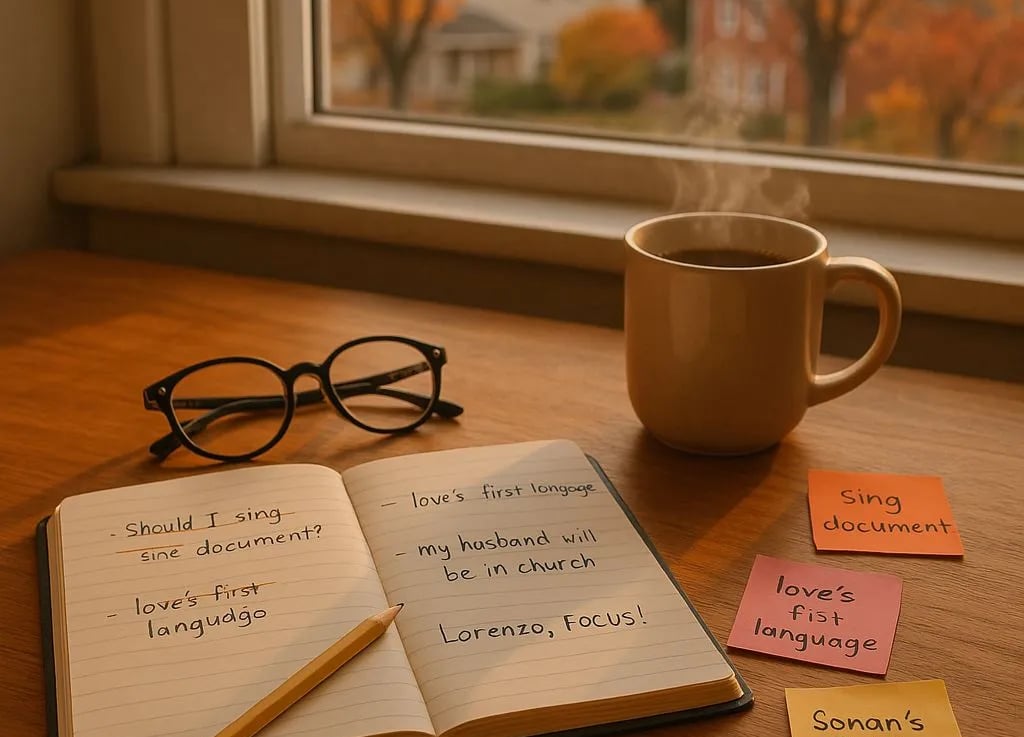Lost in Translation… and Still Smiling: Learning English in My 40s
4/10/20253 min read


Before I even start, let me say this: choosing the topic for my first blog post has been… complicated. I have so many stories I want to tell — about parenting, autoimmune adventures, living in the U.S. in 2025, and the general chaos of being human in my 40s. But for today, I’ll go with the one that’s been haunting me (and making me laugh) the most: learning English after 40.
We go way back, English and I…
I first met English in Catholic school. We had class twice a week, and I still remember my teacher’s face — Aura. That name still triggers something inside me. I “detested” her class. My friends loved it (they were practically little gringas), but for me? Torture.
Then came university.
In Colombia, high schools follow two academic calendars: Calendar A (traditional schools) and Calendar B (usually bilingual, English-Spanish). I came from a Calendar A school, but when I started university, most of my classmates were from Calendar B schools — and spoke English fluently. Me? Not so much. While they took fun classes like social theory and journalism, I was stuck in English grammar for seven straight semesters. I became part of the furniture in the language lab.
I thought I was done with English… until life said no.
After graduating, I found jobs that didn’t require English and thought: “That’s it. I’ve survived.”
Spoiler: I hadn’t.
In my 20s, I moved to China. I told myself it was to learn Mandarin — but really, I just wanted to explore. Shanghai blew my mind. The people, the culture, the food… everything felt new and exciting.
Then came day one of school. Dozens of international students from Russia, France, Mongolia, Pakistan — and what language united them all? English. Of course.
Meanwhile, I clung to the tiny Spanish-speaking group. Every time people laughed or shared stories, I stood there with a smile frozen on my face, nodding without understanding. I became “the quiet one,” the mysterious one, the “maybe rude” one… when really, I was just scared to say the wrong thing.
That’s when my second personality was born: shy, quiet, and with one life motto — “If you don’t talk, you can’t make mistakes.”
Chinese? Yes. English? Not yet.
Ironically, since I wasn’t distracted with English gossip, I learned Mandarin faster than most of my classmates.
Eventually, thought, “Enough is enough — it’s time to learn English.” So, I flew to London and enrolled in a course. I was 27, sitting in a classroom full of teens talking about clubs and boys and music. I felt 100 years old. Once again, my silent personality returned.
Then came kids, life, and… America.
Years passed. I returned home, found my passion, my perfect job, had children. Life flowed.
Until I moved to the U.S.
And guess who was waiting for me there? English, of course. With open arms and a smug little smile.
The accidental comedy begins
The good thing about turning 40 is that you finally stop caring so much. You start laughing at your mistakes instead of hiding them.
Like that day I asked my manager, “Should I sing the document?” instead of sign it. She looked confused and said, “Sure… if you want to sing, go ahead!”
Or when I told my boss, “No problem, my husband will be in church,” instead of in charge. My coworker leaned over and whispered, “I didn’t know he was religious!”
But the highlight was two weeks ago. My son was playing soccer. We were the only Latin family on the field. He looked distracted, so I shouted, “Lorenzo! Focus! Focuuus!”
Everyone turned and stared.
I asked my daughter why they were looking at me like I’d lost my mind, and she said,
“Mom… it sounded like you yelled: ‘Lorenzo! F* us! F*** us!’”**
My new motto? Laugh first, cry later.
Learning English in your 40s is not for the faint of heart. It humbles you, confuses you, changes your personality. But it also makes you brave. It reminds you that we’re all just trying — and failing — and trying again.
So if you’re also navigating life in a second language — with all the confusion, awkward pauses, and surprise punchlines — welcome. You’re not alone. And trust me, there’s always a funny story waiting around the next grammar mistake.
Contacto
linatoroa22@gmail.com
